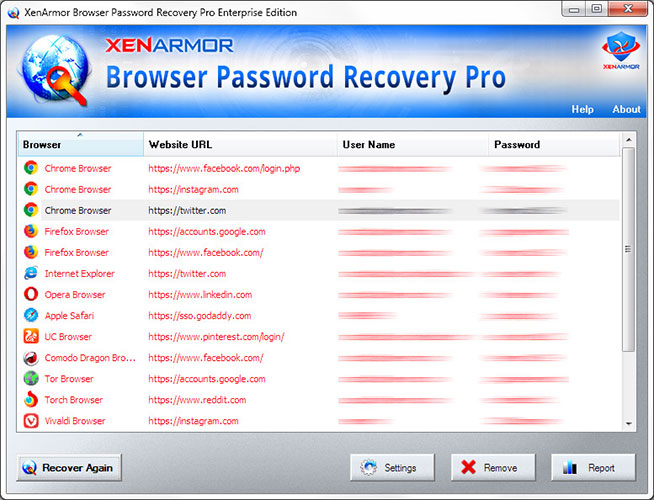How to Recover Saved Passwords in Chrome Canary Browser

This research article shows you all password secrets of Chrome Canary browser including where all your website passwords are stored, how it is stored and how to recover it automatically.
Chrome Canary Password Secrets
Chrome Canary browser stores all your website login passwords in the “Login Data” file at following location
[Windows Vista/7/8/10] C:\Users\[user_name]\AppData\Local\Google\Chrome SXS\User Data\Default\ [Windows XP/2003] C:\Documents and Settings\[user_name]\Local Settings\Application Data\Google\Chrome SXS\User Data\Default\
This “Login Data” file is stored in SQLite database format. It contains database table called “logins” where each website login details are stored.
Here are some of the interesting fields stored in this table,
origin_url - main link of the website action_url - login link of the website username_element - name of the username field in the website username_value - username used for login password_element - name of the password field in the website password_value - password used for login (encrypted) date_created - date when it is stored times_used - how many times this password is used blacklisted_by_user - set to 1 means password is never stored
Here action_url, username_value and password_value refers to website login link, username and encrypted password respectively.
Chrome Canary encrypts the website password using Windows DPAPI (Data Protection API) functions.
These DPAPI functions perform encryption of password using user and machine specific data. As a result encrypted password cannot be decrypted by another user or another computer.
Hence Chrome Canary password recovery has to be performed on the same computer as same user.
How to Decrypt Chrome Canary Passwords
Chrome Canary uses Windows DPAPI function, CryptProtectData to encrypt the website password. We can decrypt this password using the function called CryptUnprotectData.
Here is the sample C++ program to decrypt the Chrome Canary password.
void DecryptPassword(char *passData, int passLen, char *password, int length)
{
DATA_BLOB DataPassword;
DATA_BLOB DataOutput;
DataPassword.cbData = passLen;
DataPassword.pbData = (BYTE *) passData;
if( CryptUnprotectData(&DataPassword, NULL, 0, 0, 0, 0, &DataOutput) == FALSE )
{
printf("CryptUnprotectData failed with error 0x%.8x", GetLastError());
return;
}
memcpy(password, DataOutput.pbData, DataOutput.cbData);
password[DataOutput.cbData] = 0;
printf("Successfully Decrypted Password is %s ", password);
}
How to Recover Chrome Canary Passwords Automatically
Here is simple way to recover all your Chrome Canary passwords without worrying about where it is stored and how to decrypt it.
You can use our XenArmor Browser Password Recovery Pro software to instantly & easily recover all your saved website login passwords from Chrome Canary as shown in video below,
Here are the simple steps to recover all your saved passwords,
- Step 1: Download & Install Browser Password Pro from here
- Step 2: Next launch the software on your computer
- Step 3: It will automatically discover, decrypt and display all the saved Chrome Canary passwords as shown below
For more details, please refer to Online User Guide
Hope this article has helped you to understand the password secrets of Chrome Canary browser.
Let us know what do you think. Please comment below if you have any queries or suggestions.
Recommended Posts
How to Switch from PIN to Password Login on Windows
November 29, 2025





